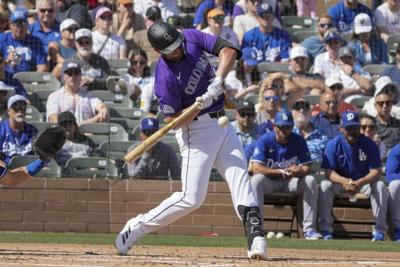COLUMN: Salary caps could save Major League Baseball from itself

I grew up in New York City in the 1950s.
In Brooklyn, to be exact, original home of the Dodgers, a team its fans affectionally nicknamed the Bums, because theyd routinely lose to the Yankees in the World Series (until 1955), which was fine with me because I was a Yankees fan.
These were the golden years of baseball in NYC with Willie, Mickey, and the Duke in center field for the Giants, Yanks, and Dodgers, respectively.
As a kid I loved the Yanks domination, winning the World Series in 7 out of 10 years from 1949-1958.
But that was when the reserve clause in players contracts could bind them to a team for life, and owners paid them far less than they were worth.
In the 1960s the players formed a union, later won free agency, and since then sell their services to the highest bidder.
Now, Im a Rockies fan and an objective old-timer whos concerned about the long-term welfare of the game.
The Dodgers, no longer bums, are endangering it with a skys the limit spending spree.
In 2024, the over $1 billion they spent in free agency was more than the rest of the league combined.
And they game the system with deferred-pay stretching out for decades.
In our market economy, bare-knuckle capitalists seek to drive their competitors out of business.
No, I havent converted to socialism.
But think of MLB as one big operation with 30 separate subsidiaries that complement one another.
The Yanks and Red Sox are bitter rivals who play to sell-out crowds.
Each wants to win every game but neither wants to put the other out of business.
MLB is in the entertainment industry competing against other sports as well as other kinds of entertainment.
Competitive parity among the teams leads to tight divisional races that drive more fans to the stands and to their TVs to watch meaningful games late in the season.
A permanent elite of big-city teams with deep pockets that routinely dominate, leaving most others to also ran status is bad for business.
MLB needs to impose a real salary cap like the NFL, NBA, and NHL.
Limiting payrolls helps to level the playing field; as do annual player drafts, in which the last shall be first; and the redistribution of national broadcast revenues.
The NFL even gives the teams that finished worst an easier schedule next year.
Instead of a salary cap, MLB levies a luxury tax on teams with the highest payrolls that it redistributes to teams with lower payrolls.
But thats not nearly enough to close the gap.
In 2025, the Dodgers payroll is $304 million; Phillies, $279 mil; Mets, $277 mil; Yankees, $276 mil.
At the very bottom are the Marlins at $44 mil; Oakland As, $54 mil; and White Sox, $61 mil.
The Rockies estimated payroll is $110-$120 million.
The MLB average is $152 million.
With understandable frustration, local critics demonize Rockies major owner Dick Monfort for not spending enough.
The problem for Monfort and owners of teams in smaller markets is that their spending is limited to their lower revenues.
In big cities like NYC and LA local broadcast revenues are far greater than in places like Denver and St.
Louis.
NFL revenues from national broadcasts are enormous and are redistributed to all the teams equally.
But revenues from MLBs national broadcasts are much lower, as are the redistributed shares.
If Monfort were to hike his payroll by a $100 million hed have to raise investment capital to do so or mortgage the team with borrowed money.
What his critics really want isnt just a new owner, but a philanthropist to buy the team.
But theyre in short supply.
In any given year, a low-payroll team can have a miracle season and win the World Series, like the Rockies almost did in Rocktober 2017.
Or the Dodgers could have all their superstars go lame and finish last.
But the probability is teams with the most loot will regularly dominate.
It wont be easy for MLB to impose a salary cap facing concerted opposition from big-city team owners and the leagues militant players union whose self-centered mentality was voiced by Oakland As slugger Brent Rooker: Teams spending money is never bad for baseball and never bad for players.
Ever.
In any situation.
In other words, the future of the game be damned.
Mike Rosen is a Denver-based American radio personality and political commentator..
This article has been shared from the original article on gazette, here is the link to the original article.
